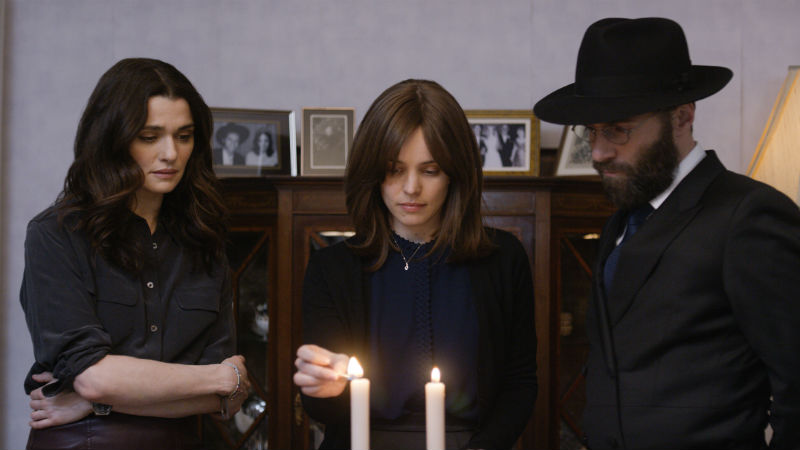QUICK SNAP: LIVE FROM TALLINN
Hot shot film producer Sharon (Moran Rosenblatt) flies home from abroad only to discover that her husband won’t let her past the gate entryphone to their home on arrival. Furious, she borrows (or, technically, steals) his parked car so she can go about her business. On arrival at her empty office, her long-standing assistant Alma (Lia Barnett) informs her that the bailiffs have taken everything.
Desperate times call for desperate measures, so she takes a meeting with another producer who under normal circumstancea she wouldn’t touch with a barge pole but who is snowed under with projects and wants her to take one of them off his hands. Thus, she becomes the producer of a comeback movie by a notorious womaniser who gave it all up to become an ultra-conservative rabbi, Uzi Silver (Rami Heuberger), a star who hasn’t worked for several years, i. The money is already in place from the Film Fund, so the project should be a piece of cake. It all looks too good to be true. And, as so often in life, when something looks too good to be true, it usually is.
Her fears abut the rabbi are confirmed when she learns that he won’t allow any women on the set apart from herself, nor will he negotiate with her (female) line producer in the room. And there’s no script – well, adapted from 1 Samuel 18-31 (this refers to the Hebrew Bible, which is apparently chaptered and versed slightly differently from the Christian one), the script is the story of King Saul visiting the Witch at Endor prior to his military defeat and his falling on his own sword. All she has to do is get someone to write a script and he’ll rubber stamp it. He himself is to play King Saul while his wife, the star who played alongside him on the last film before they got out of the movie business, is to play the Witch of Endor. To write the script, Sharon enlists the help of her old friend Shai (Uri Gottleib).
To reveal what happens next would be to spoil the film, except to say that this is one of those films where if anything can possibly go wrong for the central character, then it does. Somewhat curiously, it was billed in the festival blurb as a screwball comedy, however, I personally wouldn’t apply that label to it and fear anyone seeing this with that expectation would be severely disappointed. Thinking about it in retrospect, there IS comedy here, but it’s black comedy of the wry observation variety which may make you smile after the event but won’t make you laugh at the time.
The film is shot in stylish black and white apart from occasional sequences in preview theatres watching parts of the movie (only the odd clip here or there makes it into the film that we, the audience, are watching) which are in colour. This is scarely a new trick (see, for instance, Belfast, Kenneth Branagh, 2021) but it’s a tried and tested one that does the job. Elsewhere, the piece is nicely paced: director Anner and his editor keep it moving along nicely and you’ll agonise alongside Sharon as she undergoes one terrible experience after another.
Set in present day Jerusalem, it presents the movie business as essentially areligious in a wider culture which is clearly steeped in one of the major world religions, i.e. Judaism. The movie business is almost portrayed as a religion with its own set of irrefutable tenets (no-one puts it in these terms, but, for example, thou shalt offer opportunities for employment equally to members of both sexes) which are challenged, for good or ill, by those of conservative Orthodox Judaism (men should not touch or even associate with women, for they are unclean – my paraphrase) with the members of the Film Fund just as shocked as Sharon with Uzi’s “no women other than you on the set” demand to the point where they momentarily consider cancelling the funding.
You could argue, though, that non-association with women is exactly what Sharon’s husband does to her at the start of the piece. You could also argue that the only way she gets her films made is because she has a rich husband who bankrolls her (until, at the start of this, he no longer does) which makes it quite a smart sideswipe at the idea of the film producer who has got there by dint of hard work and talent alone. No-one suggests Sharon isn’t talented (although she’s fallen on producer’s hard times and the Uzi Silver / King Saul project is clearly her selling out, making something in which she doesn’t really believe in order to get some easy money), but equally it seems that without her husband, she is (financially) nothing, itself an ultra-conservative idea.
There would apear to be many more layers to this film on reflection, which might reveal themselves on further viewing; on first watch, however, it comes across simply as a great ride.
The Good Person plays in the Tallinn Black Nights Film Festival.










